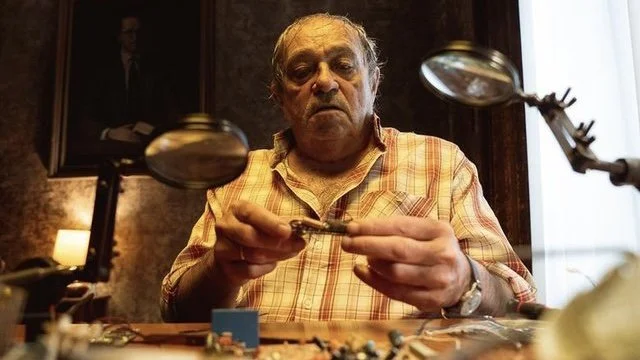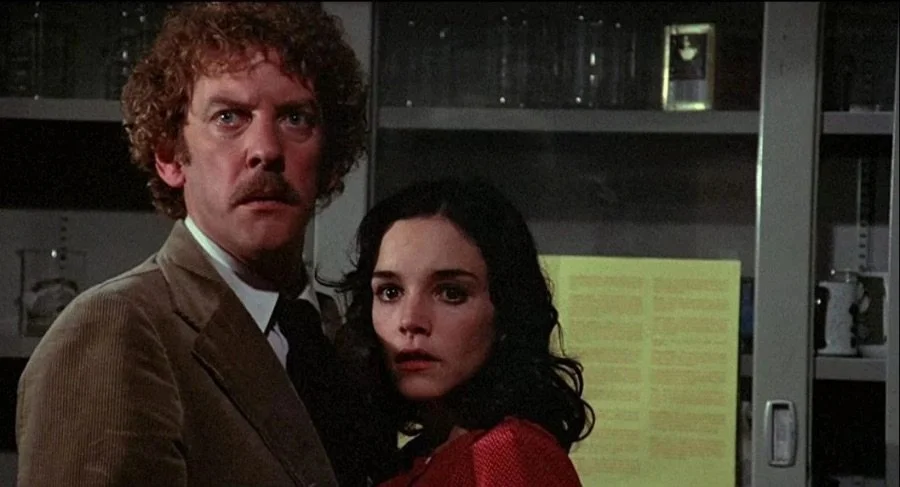Film Review — "Brooklyn 45"
Picture it! Brooklyn. December 27th, 1945…
World War 2 has officially come to a close, but the global trauma the Third Reich wrought still reverberates. One blustery night in Park Slope, military buddies with dark secrets gather in a drawing room to re-open old wounds over cocktails. One person not present is Susie, the recently deceased wife of Hock, the evening’s host; she took her own life last month during the Thanksgiving holiday, fearing Nazi spies within their midst. A hatred of “krauts” is common among these compatriots, many of whom committed horrible deeds overseas on behalf of the good ol’ USA. Most of them haven’t paid a price for it—and probably thought they never would. But as soon as the bourbon starts hitting everybody’s bloodstream, Hock reveals his ulterior motive for inviting the group to his brownstone: he wants to have a séance to commune with the dead. For closure? For kicks? In any case, they join hands and their collective sins allow hell to break loose.
Ted Geoghegan’s set-up is right up my alley… Not only do I love ghost stories, I absolutely adore chamber pieces—and Brooklyn 45 is both.
As a ghost story, Brooklyn 45 is of the Henry James variety: the specters reflect the psyches of those who encounter, or seek, them. So, since the séance participants altogether tick several of the boxes on the proverbial war criminal checklist, the phantasmic forces they meet are appropriately antagonistic toward them. It doesn’t take much effort for the literal ghosts to unearth the figurative ghosts buried deep within the veterans’ souls, at which point things start getting really interesting. And because this is a Freudian ghost story, the worst ghosts in Brooklyn 45 are not the ones we see on screen, but rather the ones that dwell within the hearts of the characters.
Ghosts can be quite a formidable literary symbol when used with intention. Despite the possibilities being seemingly endless, audiences don’t need to stretch their imagination or suspend their disbelief too much to buy in to most ghost stories, which is part of what makes them so cogent in horror. Even the least spiritual among us are usually willing to indulge the idea of their existence from time to time and might even find themselves questioning their paranormal-agnosticism on occasion. I, for one, am regrettably one of the aforementioned “least spiritual” persons—and yet I readily and regularly give myself over to the notion of the other side to enhance my spectating/reading experience. Hell, pour me a decent scotch and sit me down in your parlour, and I’m already halfway to believing! I’m also just an enthusiast for good storytelling who relishes single-location tales, which are definitely not easy to do.
In addition to character and plot, something a great chamber piece must have is keen set decoration. There’s no sure-fire one-way to go about it, but it needs to serve the tale at hand, somehow. You could put a bunch of characters in a cramped, mostly plain space with nowhere to go, so as to play on everyone’s claustrophobia, as Sidney Lumet did with 12 Angry Men. Or you could put a handful of characters in a roomier, super-furnished space with plenty of pockets for action, so as to play on everyone’s paranoia, as Quentin Tarantino did with The Hateful Eight. Or… you could go the Ted Geoghegan route and fittingly split the difference. Hock’s drawing room, where 95% of the story takes place, is exquisitely adorned, but not obnoxiously so. There’s a texture that entertains our eye without distraction, widening our attention without pulling focus. Memories and trinkets—bits of history, reminders of what they’ve done—surround the characters. All the scenic elements are well-balanced, another key chamber piece trait.
The skilled cast is well-balanced, too. Brooklyn 45 is an ensemble piece, but while it’s decidedly not anyone’s star vehicle, there are standouts. Anne Ramsay, whom I’ve been a fan of since her brief stint on Dexter, is incredible as Marla, a retired military interrogator who knows how to get the toughest enemy combatants to tell her anything using only a simple hairpin… I have a penchant for selfless performers, and I’d describe Ramsay as such: an actor whose work is in service of the text and not the other way around. If there is an actor whose talents the text itself is building up, however (not a diss), it’s Larry Fessenden’s Hock, a messy man with a complicated worldview. The role requires an intensity that must maintain even when the character is not the focal point, and Fessenden nails the assignment. Another juicy part is DiFranco, played by Ezra Buzzington. DiFranco is the mortal antagonist of the group, a man whose toxic devotion to America is so palpable it’s nauseating. Buzzington excels at radiating DiFranco’s noxious aura—American fascism has got him fucked up!
America sure ain’t perfect, but Ted Geoghegan never lets us forget the disease of Nazism, either. Now, I can’t believe I feel the need to say this, but… Dear moral puritans, the beliefs and actions of the characters on screen do not negate the atrocities committed by the enemies from their recent past. Both of the following statements can be true: “Nazis are the scum of the earth” and “Some American agents are pieces of shit”. Geoghegan knows this. He is not attempting equate the American military to Nazi Germany, or try to “what-about” World War 2—to think he is would be ridiculous and an alarmingly facile read of the film. (Nuance is hard, I know.) The vileness of Nazi Germany was so severe, in fact, that these American characters were permanently damaged; that trauma is why they are the way they are. Their individual transgressions are 100% on them, of course, but it goes to show how a tremendous force of evil can irreparably pollute people’s minds and lead them to committing their own heinous behavior, even beyond the battlefield. And in Brooklyn 45 we see what happens to such people when those foes are gone, when the war is over but obsessions persists, when they’re home but landmines abound.
Ted Geoghegan has crafted a fabulous little film with some big themes. Things get incrementally more knotty as the story progresses, but that makes sense to me—it ought to be a tad convoluted, in my opinion. If stuff like this were simple, there’d be no point in dissecting it.


